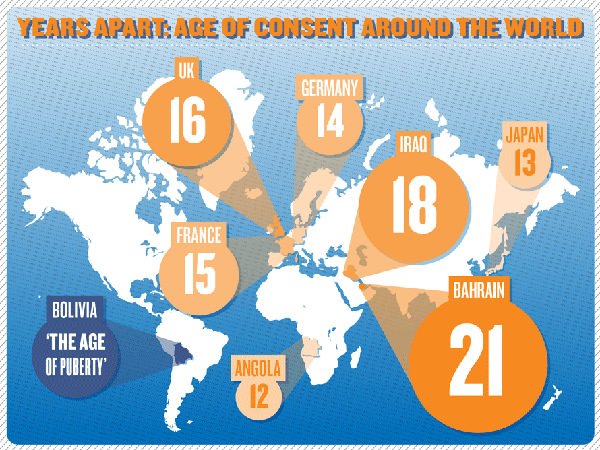Age of Consent (Part Two)

In PART ONE of this series (https://steemit.com/voluntaryism/@larkenrose/age-of-consent-part-one) I laid down some basic principles and concepts related to the idea of “incompetents,” and the necessity of other people sometimes making their choices for them, such as an adult stopping a child from wandering into the street, or someone disarming some heavily intoxicated person swinging a gun around. Now it’s time to apply those concepts to the controversial and uncomfortable concept of “age of consent,” as it relates to sex.
In short, if someone doesn’t have the mental awareness and understanding to make an informed decision, true consent is impossible. It is impossible, for example, for a small child to consent to sex, because they have no real understanding of what it is, what it will do to them, what it will later mean to them, and how it will later impact them, physically or emotionally. So even if some slimy adult gets a child to “agree” to do something sexual, that is not true consent, and the adult is guilty of deception and coercion (of the most repulsive kind).

By analogy, imagine that a four-year-old child has inherited a one ounce gold coin. Then some crook comes along and says, “Hey kid, want to trade that stupid old coin for this yummy candy bar?” If the child, out of ignorance, wants to make such a trade, what right does anyone else—parent or otherwise—have to intervene? Answer: they have every right to intervene, because the child has no idea what is actually happening, and what he would be losing. That trade cannot be called voluntary if the child doesn’t at all really understand what he is “agreeing” to. The child is not competent to make that decision, which makes such a “deal” inherently illegitimate, and anyone therefore has the right to do whatever it takes to stop such an exchange from happening, even if the child (from his place of ignorance) wants it to happen.
The same is true of the notion that small children can “consent” to sex. They can’t. They don’t know what it is. They don’t know what it means. And they have no idea the harm it will do to them. There are, sadly, many millions of examples of people who were sexually abused as children, without any overt physical violence ever happening, who are still deeply and profoundly traumatized and scarred. The fact that they weren’t violently raped, but were instead cajoled, bribed, or otherwise “persuaded,” doesn’t make it voluntary, doesn’t make it consensual, and sure as hell doesn’t make it harmless.
(Side note: Ya know that thing I said before about the importance of being able to discuss emotional issues calmly and rationally? In case you’re wondering, I’m finding that challenging right now. But describing what I would do to any adult that I discovered trying such things is not really relevant to the principles involved here.)

Obviously actual rape, violently-imposed sex, is a heinous crime, regardless of the age of the victim. But when there is no overt physical violence, where do we draw the line? Somewhere between the heinous thought of child molestors seducing innocents, and teenagers fooling around in the back seat down at “Lover’s Lane,” we hit the gray area. At what point can someone actually consent to sex? At what point should they be considered informed and competent enough to know what it is that they are deciding?
There are all sorts of factors involved, including the young person’s awareness of things, mental capacity, level of responsibility and understanding of consequences, etc. In a lot of places, including this country a few generations ago, people would take on a lot more responsibilities at a much younger age. It was societally expected, and for survival it was necessary. You had children who were hardly even teenagers yet running farms, doing the hunting, getting married, etc. Now much of the culture trains young people to be irresponsible and ignorant for many years. A child’s environment and upbringing obviously has a huge impact on when they should be seen as “competent” to make all sorts of decisions.

To be honest, even a lot of adults these days seem so damn clueless and irresponsible that calling them “competent” seems to be giving them way too much credit. And yet, I wouldn’t forcibly interfere with them engaging in any victimless activities—sex, drugs, playing around near a cliff, etc.—no matter how stupid I thought their choices were, even if I thought they were probably harming themselves. This illustrates the fact that true consent is not dependent upon some IQ threshold, and that stupid and/or ignorant people can consent to things, too.
So where is the dividing line? The truth is, there is no simple formula, and no convenient line, that applies to everyone. And that means it often comes down to having to make a judgment call. And while children might be the most obvious example of this, they are not the only one. If I saw some senile old woman driving in a way that was obviously endangering her own life and the lives of everyone around her, I would stop her if I could. However—and this is important—the goal of all of it would remain the same: the protection of the innocent, which sometimes even means the protection of the innocent from themselves.
And yes, again, of course the very idea can be a “slippery slope.” No, I don’t mean that it’s perfectly okay to forcibly interfere in everyone’s lives as long as you say it’s “for their own good” (one of the tyrants’ favorite excuses). But, if it’s what someone would have wanted if they were informed, aware, competent and in their right mind, then there are times when I would (and when anyone else should) make their decisions for them, even if it means doing so without their consent or cooperation.

A lot of the underlying principle here can be found in the teaching, “Do unto others as you would have done unto you.” But to make it a bit more specific, for purposes of this discussion, we should add the element of cognisance and understanding: “Treat others how you hope they would treat you in the same situation, if they knew and understood the whole situation but you didn’t.” So, for example, any sane adult would retroactively appreciate someone who stopped them from wandering into traffic when they were a child. And any sane adult would retroactively appreciate someone who intervened to prevent them from being seduced and victimized by a sexual predator. To describe it another way, if the “future them” would obviously want you to intervene, even if that required force, then you should intervene, even if that requires force.
(PART THREE can be found here: https://steemit.com/voluntaryism/@larkenrose/age-of-consent-part-three)
(P.S. If you find value in the writings, videos, or other works of Larken Rose, or want to support the making of “The Mirror,” feel free to support his efforts by PayPal (to “[email protected]”) or Bitcoin (16q2CrisrzCZUA87QLq8Z8CSXTCcwzpWza), or through Patreon (https://www.patreon.com/user?u=347021).)

Great stuff as always, Larken.
What do you say to those who are convinced anarchists just don't understand "the real world" and if we were as learned or experienced as them, we'd "clearly" understand the need for a Hobbsian Leviathian to maintain the basic structures they believe are required for society to function as many humans are living together in small spaces like cities. I see versions of the argument you using here used to justify the need for benevolent dictators (they would call them "duly elected public servants") who just know better than all those simpletons who can't be bothered with civil affairs cities, counties, and states have to deal with.
I think we place too much value on consent in certain areas and not enough in other areas. The doctor's office is supposed to be a place of informed consent for example, but in the US we vaccinate against polio still. There is zero need to do that unless you are leaving the US, yet the pressure is pretty much so incredible that consent is implied. It used to be the same way with circumcision but now people are beginning to question the very poor logic of that process. In the driving schools, and licensing, the responsibility is so drilled in that nobody listens, hence horrible drivers from coast to coast. I am curious to see where you are going here though, read part I too.
So what of mentally challenged people? The same rules as the children?
Thanks for giving information
Mere consent is insufficient. It must be informed consent.
I think "informed consent" is actually redundant. If it's not informed, it's not really consent. But I think that's just a slightly different way of making the same point.
Awesome post friend.
I like your all content because your content type and quality is so good.
best of luck go ahead friend.
This was too obvious, with your comment right next to an identical one.
Tell you what: search out "how to interact positively on Steemit" and variations, explain to me in a comment why spam comments like yours and @muhammadkamal's are not welcome, and that you won't be doing it again -- which anybody can verify, Steemit is an open platform: https://steemit.com/@sojib24/comments -- and I'll remove my downvote.
It seems almost every single one of your comments is copy/pasted, matching the above. Please stop, your reputation is at stake.
Is there some bot for sale that does this for new accounts? If so, your money's being wasted. If not, we know two accounts share an owner, or at least, "learned" from the same process.
Awesome post friend.
I like your all content because your content type and quality is so good.
best of luck go ahead friend.
This was too obvious, with your comment right next to an identical one.
Tell you what: search out "how to interact positively on Steemit" and variations, explain to me in a comment why spam comments like yours and @sojib24's are not welcome, and that you won't be doing it again -- which anybody can verify, Steemit is an open platform: https://steemit.com/@muhammadkamal/comments -- and I'll remove my downvote.
It seems almost every single one of your comments is copy/pasted, matching the above. Please stop, your reputation is at stake.
Is there some bot for sale that does this for new accounts? If so, your money's being wasted. If not, we know two accounts share an owner, or at least, "learned" from the same process.
Larken Rose obviously didn't do any research at all before writing these articles. He mindlessly regurgitated David Finkelhor's "informed consent" theory, which has been debunked decades ago.
But, of course, since Larken Rose didn't bother to do any research before he provided the justification for violence against pedophiles, he probably didn't even know whose words he regurgitated when he wrote this
article.
So, here is a link to four sections of the book "Taboo Zone: Scientific knowledge and ethical principles for dealing with child sexuality and pedophilia".
Section "arguments" deals with David Finkelhor's "informed consent" theory and demonstrates why it is invalid.
https://mega.nz/#F!i3wQTYDQ!XbX3NJff23SyujGPEmM3LQ